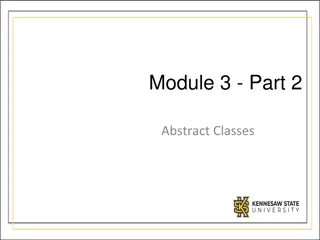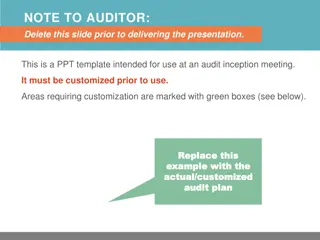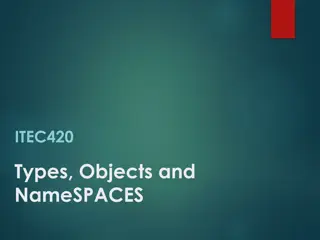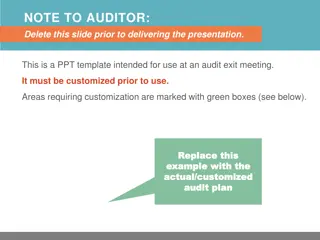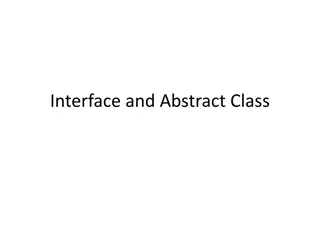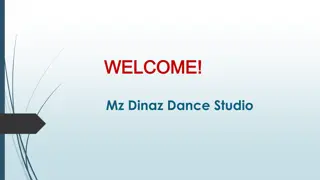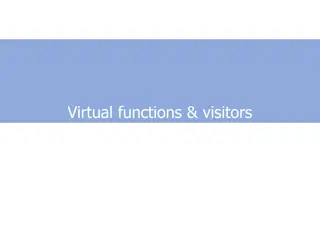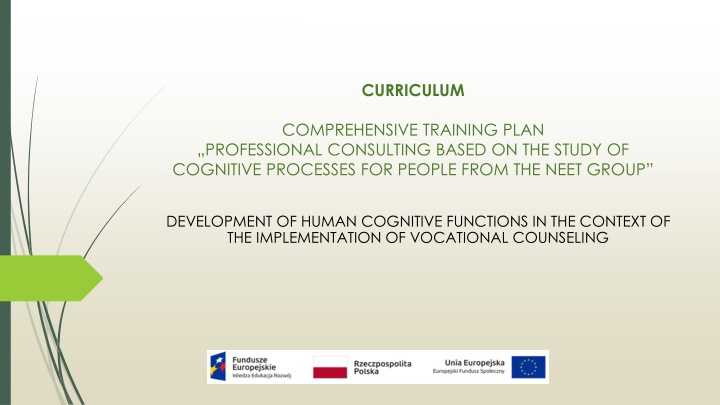
Comprehensive Training Plan for Cognitive Processes in NEET Group
Develop cognitive functions and vocational counseling skills for individuals in the NEET group through a comprehensive training plan. Focus on building independence, decision-making abilities, and social roles. Support individual development and unlock potential to improve employability.
Download Presentation

Please find below an Image/Link to download the presentation.
The content on the website is provided AS IS for your information and personal use only. It may not be sold, licensed, or shared on other websites without obtaining consent from the author. If you encounter any issues during the download, it is possible that the publisher has removed the file from their server.
You are allowed to download the files provided on this website for personal or commercial use, subject to the condition that they are used lawfully. All files are the property of their respective owners.
The content on the website is provided AS IS for your information and personal use only. It may not be sold, licensed, or shared on other websites without obtaining consent from the author.
E N D
Presentation Transcript
CURRICULUM COMPREHENSIVE TRAINING PLAN PROFESSIONAL CONSULTING BASED ON THE STUDY OF COGNITIVE PROCESSES FOR PEOPLE FROM THE NEET GROUP DEVELOPMENT OF HUMAN COGNITIVE FUNCTIONS IN THE CONTEXT OF THE IMPLEMENTATION OF VOCATIONAL COUNSELING
PARTICIPANTS NEET Group (not in employment, education or training) A social group that includes young people who are outside the sphere of employment and education, i.e. those who are not studying, working or preparing for a profession at the same time. A broader term than the young unemployed, it also covers professionally inactive graduates (i.e. those who do not have a job and are not looking for a job) and people who left education prematurely but did not enter the labor market for various reasons.
OBJECTIVES The aim of the workshop is: building a positive image of yourself and a sense of agency in relationships with other people, shaping independence and consistency in action, implementation to make independent decisions, improving the ability to play various social roles.
OBJECTIVES Support for people from the NEET group, understood as supporting their individual development, The use of one's own possibilities and development potential, i.e. the physical, mental and social resources at the disposal of an individual, which creates an opportunity to change the conditions in which they live. Helping individuals gain insight into their difficulties and apply development strategies that will allow them to work towards reaching their full potential.
DEVELOPMENT OF COGNITIVE FUNCTIONS As part of the program, particular attention was paid to the development of the following cognitive functions: organizational skills and planning, managing emotions, social skills, counseling in dealing with other people.
DEVELOPMENT OF COGNITIVE FUNCTIONS The paradigm of the contemporary professional career assumes that it is "a dynamic process consisting in a constant search for competences with market value and knowledge useful in the market". The entity, aspiring to become more attractive among employers, is looking for skills that will increase its chance of gaining a significant position on the labor market.
DEVELOPMENT OF COGNITIVE FUNCTIONS The entity takes over the role of an "entrepreneur" building their own qualifying capital primarily through continuous improvement, responsibility for their own professional development. The readiness to accept this commitment forces the individual to know himself very well, to be aware of his own predispositions and talents, to have a flexible vision of the development path and to be ready to implement it.
DEVELOPMENT OF COGNITIVE FUNCTIONS Each entity develops its own strategies for the implementation of such a task, and therefore should be alert to the emerging opportunities conducive to success. The potential employee must demonstrate flexibility in the labor market and constantly adapt to its offers. This mechanism forces the individual to constantly update his knowledge and skills or acquire new ones that guarantee his place in it.
DEVELOPMENT OF COGNITIVE FUNCTIONS Lifelong learning concept As a result, multiple changes in the place and nature of work throughout one's life are part of the pursuit of a career path, and learning, including a new profession, has taken the form of a lifelong process. Due to the increasing requirements of employers towards potential employees, having education more and more often has to be supplemented with appropriate competences and professional experience.
DEVELOPMENT OF COGNITIVE FUNCTIONS Lifelong learning concept Skills, experience and knowledge acquired outside of the traditional understanding of education turn out to be very useful and sometimes crucial in obtaining employment. The multitude of experiences and skills helps in easier adaptation to the requirements of the labor market, creates a wider range of opportunities for retraining and supplementing one's knowledge.
CHANGE OF APPROACH IN CAREER COUNSELING Life experiences and crisis situations Life experiences are made up of critical events that contribute to learning. One of the strategies of coping with crisis situations is opening up to new knowledge, searching for information, learning new behaviors. In difficult situations, counseling may be helpful, thanks to which the consultant can learn about the possibilities of dealing with the situation in which he or she finds himself.
CHANGE OF APPROACH IN CAREER COUNSELING A new approach to both education and career guidance In adult education, there has been a shift from institutional to individual learning. Learning has taken the form of a lifelong process in which the individual becomes an autonomous subject. In the process of acquiring knowledge, an important role is played by the individual's everyday experience, gained in everyday interactions, both in a conscious and unconscious way.
CHANGE OF APPROACH IN CAREER COUNSELING Expanding the importance of counseling For many years, counseling and counseling have been considered in the context of choosing a profession. Currently, the meaning of counseling is beginning to include additional issues. Counseling ceases to rely only on ad hoc assistance in choosing the right profession, providing information on individual professions, and the possibility of retraining in the field chosen by the individual.
CHANGE OF APPROACH IN CAREER COUNSELING Change in the relationship between the counselor and the consultant While the previous definitions of career counseling focused on the counselor as the one who gives specific instructions, the counseling in the contemporary sense emphasizes the autonomous attitude of the counselee. In this context, the new attitude of the counselor is reduced to a person who does not impose his opinion, does not provide ready solutions, does not help the consultant in making decisions, but aims to help her make the most appropriate choice for her.
CHANGE OF APPROACH IN CAREER COUNSELING Change in the relationship between the counselor and the consultant Such outlined relationships make the counselee more responsible for his decisions. The counselor should also be a person who makes the counselee aware of changes in thinking about learning in the context of gaining new qualifications and competences.
ADVANTAGES OF USING THE NEW METHOD The sessions are designed to raise the self-awareness and develop the social skills of the participants. Finding yourself in the modern labor market requires you to acquire new competences: reflectivity, adaptability, the ability to construct one's own identity, the ability to balance professional and non-professional life, narrative employability.
ADVANTAGES OF USING THE NEW METHOD Key success factors in the labor market The key determinant of the course of the professional process of an individual is their ability to be employed, which they see not only in the conditions of the labor market, but also in the causative capacity of the entity related to building a network of relations with employers and the ability to promote own resources.
ADVANTAGES OF USING THE NEW METHOD Supporting personal development Participation in educational activities can provide experiences that have the potential to support personal development. The sessions are based on personal experiences and peer support. The structured framework offered by this program enables the individual to derive the greatest benefit from the activities undertaken. To achieve this, it is necessary to support, conduct self-control and set goals, monitor progress on an ongoing basis, and then review and reflect on the lessons learned.
ADVANTAGES OF USING THE NEW METHOD The program supports personal development: provides a structure to support development; it allows people to find out about their strengths and weaknesses gives feedback; helps individuals deal with barriers to development; supports individual decision making.
ADVANTAGES OF USING THE NEW METHOD The program supports personal development It also supports an understanding of the need for reliability and consistency, especially at work. The development of this knowledge and skills can contribute to: growing self-confidence, gaining knowledge, skills and experiences valued by the employer, increase in self-awareness required for success in every aspect of life.
RECOMMENDATIONS FOR THE IMPLEMENTATION OF THE WORKSHOPS
PROGRAM The program is divided into 5 modules: MODULE I - Local labor market MODULE II - Employment and earning in a flexible form MODULE III - Emotions and stress related to job search MODULE IV - Effective team MODULE V - Communication with the client
PROGRAM Each module includes group and individual lessons. During group and individual classes, participants use worksheets with exercises related to the subject of individual thematic modules. The program and implementation of group and individual classes is described in the scenarios for group and individual classes.
DOCUMENTATION The documentation for each module includes: group class scenario worksheet for group activities scenario of individual classes work card for individual classes
DOCUMENTATION Worksheets for group activities contain exercises and the content of mini - lectures planned during the workshops. Worksheets for individual classes include exercises and materials supplementing the topics covered within the module.
TRAINING TECHNIQUES Various training techniques are used during the classes: individual exercises exercises in pairs exercises in small groups team tasks for scenes according to prepared scenarios case study simulations group presentations psychological questionnaires mini - lecture group discussions
ORGANIZATION OF CLASSES The program should be led by trainers / counselors / psychologists with experience in working with people from the NEET group. Their knowledge of the issues of social and professional activation and preparation for work using workshop methods is important. Ideally, classes should be conducted by two coaches, or a trainer and an assistant trainer.
ORGANIZATION OF CLASSES The group lesson plan includes a program to be implemented over eight hours. Breaks should be organized during the classes, depending on the needs of the group participants and the dynamics of the classes. Group size should not exceed 15 people, groups of 10-12 people are the most effective.
MODULE I - LOCAL LABOR MARKET GROUP CLASSES RESULTS: developing independence in finding employment and navigating the local labor market analysis of your strengths and opportunities on the local labor market getting to know and analyze your preferences and professional predispositions shaping attitudes that enable effective and responsible functioning in the work environment
MODULE I - LOCAL LABOR MARKET GROUP CLASSES PROGRAM: Introduction - Introducing the program, trainer and training participants Exercise 1 - RULES OF WORKING IN A GROUP Exercise 2 - DRAWING IN PAIRS Exercise 3 - THE COMPANY OF THE FUTURE Exercise 4 - MY PERFECT WORK Mini lecture - SUCCESS ON THE LABOR MARKET
MODULE I - LOCAL LABOR MARKET GROUP CLASSES Exercise 5 - TEST OF PROFESSIONAL PREFERENCES AND PREDISPOSITIONS Exercise 6 - YOU'RE LATE AGAIN Exercise 7 - LABELS Exercise 8 - CASE STUDY "JANEK" / SIMULATION Exercise 9 - CASE STUDY "JANEK" / PROBLEM ANALYSIS Exercise 10 - GRADUATE PROGRAM
MODULE I - LOCAL LABOR MARKET INDIVIDUAL CLASSES RESULTS: developing awareness of your strengths and self-esteem in the labor market acquiring knowledge about the principles of career planning in the context of choosing a profession and future specialization learning about the local labor market analysis of your preferences and professional predispositions learning about the individual learning style learning about the principles and methods of active job search
MODULE I - LOCAL LABOR MARKET INDIVIDUAL CLASSES PROGRAM: Exercise 1 - SWOT ANALYSIS Exercise 2 - MY PROFESSIONAL POTENTIAL Exercise 3 - PERFECT JOB Exercise 4 - SURVEY TO COLLECT INFORMATION ABOUT THE PROFESSION Exercise 5 - LEARNING STYLES test Materials - ACTIVE JOB SEARCH
MODULE II - EMPLOYMENT AND EARNINGS IN A FLEXIBLE FORM GROUP CLASSES RESULTS: learning about the principles of career planning getting to know and analyze your preferences and professional predispositions shaping attitudes that enable effective and responsible functioning in the work environment the acquisition of planning, decision-making and problem-solving skills in building a professional plan
MODULE II - EMPLOYMENT AND EARNINGS IN A FLEXIBLE FORM GROUP CLASSES PROGRAM: Exercise 1 - VOCATIONAL CAREER PLANNING Exercise 2 - WORK VALUES Exercise 3 - CAREER ANCHORS Questionnaire Mini - lecture - PLANNING AND CAREER STRATEGIES Exercise 4 - COMPETENCES quiz Exercise 5 - JULIA CASE STUDY / SIMULATION
MODULE II - EMPLOYMENT AND EARNINGS IN A FLEXIBLE FORM GROUP CLASSES Exercise 6 - JULY CASE STUDY / SITUATION ANALYSIS Exercise 7 - COMPETENCY PROFILE Mini - lecture - SHAPING A PROFESSIONAL IMAGE Exercise 8 - QUALIFICATION INTERVIEW SCENARIO Exercise 9 - SIMULATING A CONVERSATION Exercise 10 - CHECKLIST
MODULE II - EMPLOYMENT AND EARNINGS IN A FLEXIBLE FORM INDIVIDUAL CLASSES RESULTS: learning about the principles of effective job search developing awareness of your preferences and potential labor market opportunities acquisition of decision-making and problem-solving skills in building a professional plan shaping attitudes that enable effective and conscious functioning in the work environment gaining knowledge on the preparation of application documents
MODULE II - EMPLOYMENT AND EARNINGS IN A FLEXIBLE FORM INDIVIDUAL CLASSES PROGRAM: Exercise 1 - "HOW DO I LOOK FOR A JOB" QUESTIONNAIRE Exercise 2 - PLANNING AS THE BASIS OF SUCCESS Exercise 3 - DECISION MAKING Exercise 4 - THE SIX HAT METHOD Exercise 5 - MOTIVATION LETTER Materials "APPLICATION DOCUMENTS"
MODULE III - THE EMOTIONS AND STRESS OF SEARCHING FOR A JOB GROUP CLASSES RESULTS: raising awareness about coping with stress and emotions related to job seeking developing your strengths and self-esteem in the labor market increasing the efficiency and professionalism of self-presentation in the process of seeking employment and in contacts with employers shaping attitudes that enable effective and responsible functioning in the work environment
MODULE III - THE EMOTIONS AND STRESS OF SEARCHING FOR A JOB GROUP CLASSES PROGRAM: Exercise 1 - WHAT YOU FEEL AND WHAT YOU THINK ABOUT YOUR CURRENT SITUATION Exercise 2 - CONSEQUENCES OF UNEMPLOYMENT Exercise 3 - CAUSES AND SYMPTOMS OF STRESS Mini - lecture - PSYCHOLOGICAL EFFECTS OF UNEMPLOYMENT Exercise 4 - READINESS FOR CHANGE QUESTIONNAIRE Exercise 5 - PORTRAIT
MODULE III - THE EMOTIONS AND STRESS OF SEARCHING FOR A JOB GROUP CLASSES Exercise 6 - MY ACHIEVEMENTS Exercise 7 - CREATIVITY Exercise 8 - MY STORY Mini - lecture - PSYCHOLOGICAL FACTORS OF PROFESSIONAL SUCCESS Exercise 9 - IF NOT SUCCESSFUL ... Exercise 10 - PRINCIPLES OF EFFECTIVE ACTION
MODULE III - THE EMOTIONS AND STRESS OF SEARCHING FOR A JOB INDIVIDUAL CLASSES RESULTS: learning about the mechanism of stress generation analysis of own reactions in difficult situations and learning techniques related to negative thinking and own behavior raising awareness about coping with stress and emotions related to job seeking developing the ability to use relaxation techniques
MODULE III - THE EMOTIONS AND STRESS OF SEARCHING FOR A JOB INDIVIDUAL CLASSES PROGRAM: Exercise 1 - STRESS AND EMOTIONS Exercise 2 - NEGATIVE THINKING Exercise 3 - THE ANGER MECHANISM Exercise 4 - A-B-C MODEL Exercise 5 - PROGRESSIVE MUSCLE RELAXATION Materials - MANAGING STRESS AND DIFFICULT SITUATIONS
MODULE IV - EFFECTIVE TEAM GROUP CLASSES RESULTS: development of team cooperation skills analysis of problems and barriers in the process of building an effective team improving the skills of flexible conflict resolution shaping attitudes that enable effective functioning in a team increasing social competences and preparing for professional activity in future work
MODULE IV - EFFECTIVE TEAM GROUP CLASSES PROGRAM: Exercise 1 - PUZZLE Exercise 2 - BUILDING A TOWER Exercise 3 - MY ROLE IN THE GROUP Questionnaire Exercise 4 - "DOROTA" CASE STUDY / SIMULATION Exercise 5 - "DOROT" CASE STUDY / PROBLEM ANALYSIS Mini - lecture - RULES OF TEAM WORK
MODULE IV - EFFECTIVE TEAM GROUP CLASSES Exercise 6 - INTEGRATION TRIP Exercise 7 - NEW TENANT Exercise 8 - DEFINITION OF A CONFLICT Mini - lecture - SOLVING CONFLICTS Exercise 9 - HOW DOES A CONFLICT ARISE? Exercise 10 - WHAT IS A CONFLICT FOR ME?
MODULE IV - EFFECTIVE TEAM INDIVIDUAL CLASSES RESULTS: analysis of problems and barriers in the process of building an effective team development of team cooperation skills diagnosis of one's own style of conflict resolution understanding the advantages and disadvantages of the five conflict resolution styles improving the skills of flexible conflict resolution
MODULE IV - EFFECTIVE TEAM INDIVIDUAL CLASSES PROGRAM: Exercise 1 - RULES OF TEAMWORK Exercise 2 - THE DESTRUCTIVE AND CONSTRUCTIVE ROLE OF THE CONFLICT Exercise 3 - STYLES OF SOLVING CONFLICTS Exercise 4 - MY CONFLICT - ANALYSIS OF NEEDS AND BEHAVIOR Exercise 5 - CONFLICT STRUCTURE Materials - THE ART OF COMPROMISING





